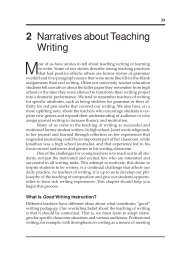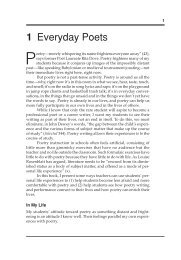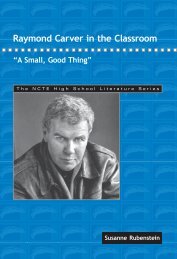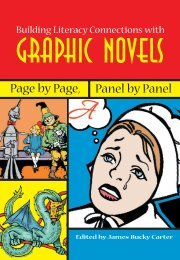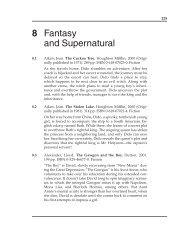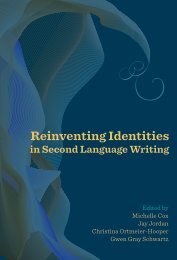Wood_cover.qxd (Page 1) - National Council of Teachers of English
Wood_cover.qxd (Page 1) - National Council of Teachers of English
Wood_cover.qxd (Page 1) - National Council of Teachers of English
- No tags were found...
You also want an ePaper? Increase the reach of your titles
YUMPU automatically turns print PDFs into web optimized ePapers that Google loves.
Interdisciplinary Connections 79What are the three different types <strong>of</strong> memory?◆ Working memory, long-term memory, and skill memoryWhich parts <strong>of</strong> the brain are responsible for each type <strong>of</strong> memory?◆ Working memory occurs in the prefrontal cortex. Long-termmemory is kept in the hippocampus. Skill memory is in the cerebellum.What are some problems with memory? (Answers may vary.)◆ Sometimes people remember events differently from the waythey really happened.◆ People sometimes remember things that didn’t really happen.◆ Things like stress and sleep deprivation can cause memory loss.What are mnemonic devices?◆ Mnemonic devices are ways to help people remember thingssuch as lists, the order <strong>of</strong> operations, or vocabulary in a foreignlanguage.Why do mnemonic devices work?◆ Mnemonic devices work because they help break complicatedinformation into more manageable pieces. They connect priorknowledge to new knowledge helping the brain to make sense<strong>of</strong> information it has never seen before.Figure 4.2. Brain questions and answers.bers other bits and pieces <strong>of</strong> information about his father, like the factthat he was a serious man with a good memory and that he would beashamed <strong>of</strong> the speaker because his memory has no order.While reading this poem with the class, ask them to think aboutwhat they have learned about the brain. Is the speaker using long- orshort-term memory? Is he using the hippocampus, cerebellum, or theprefrontal cortex? How do you know? Ask students to work individuallyor in small groups to underline the parts <strong>of</strong> the poem that indicatesome sort <strong>of</strong> memory and label those lines with a part <strong>of</strong> the brain. Studentsshould be able to explain their answers using textual evidenceand/or information they gathered from the Exploratorium Web site.MnemonicI was tired. So I lay down.My lids grew heavy. So I slept.Slender memory, stay with me. 11. This seems to be a long-term memory because the speaker wants it to stay with him.It would be in the hippocampus. (Alex)



